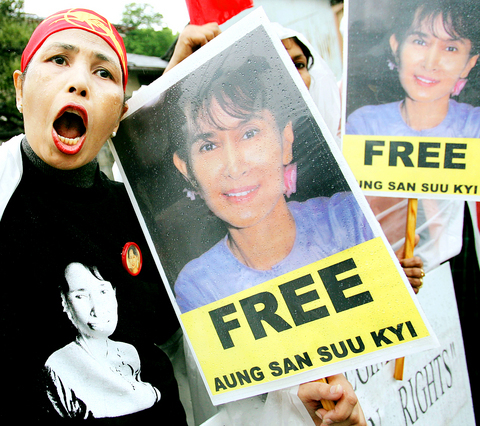Foreign ministers from Asian and European countries were scheduled to start their two-day annual talks yesterday evening in Japan's western Kyoto prefecture on issues such as North Korea's nuclear program and Myanmar's human rights record.
Meetings between Japanese and Chinese foreign ministers, as well as between Japanese and South Korean foreign ministers on the sidelines of the Asia-Europe meeting (ASEM) are also expected to address recent anti-Japan sentiment over handling of its war history.
According to Japanese government officials, the ASEM meeting was to start yesterday evening with the first round of full sessions in which participants are expected to discuss political issues, including how best to reform the UN, prevention of proliferation of weapons of mass destruction, and North Korea.

PHOTO: AFP
Representatives from the 10 members from the Association of Southeast Asian Nations, Japan, China, South Korea and the 25 EU members as well as the European Commission will join the ASEM talks. Japanese Foreign Minister Nobutaka Machimura will chair the meeting.
Ahead of the ASEM meeting, South Korean Foreign Minister Ban Ki-moon and Chinese Foreign Minister Li Zhaoxing met at a Kyoto hotel yesterday and agreed to try to resume six-nation talks as soon as possible and peacefully resolve North Korea's nuclear program.
The six-way talks involve China, Japan, North and South Korea, the US and Russia with the last meeting ending in June of last year unsuccessfully.
Tensions have risen following Sunday's testing of a short-range missile into the Sea of Japan by North Korea. In February, Pyongyang admitted it had nuclear weapons and would no longer participate in talks on the subject.
China and South Korea have urged North Korea not to do anything that would further isolate itself during reports of preparations for an underground nuclear test.
"The ministers said any moves by North Korea that deteriorate the situation further would not help and only further isolate itself," South Korean official Park Joon-woo said.
Meanwhile, EU External Relations Commissioner Benita Ferrero-Waldner is expected to meet with Myanmar's foreign minister, Nyan Win, on the sidelines of the ASEM meeting.
Myanmar joined ASEM last year at a meeting in Vietnam.
The EU official is expected to raise concerns about the Southeast Asian military junta's human rights record and detention of opposition leader Aung San Suu Kyi during the EU-Myanmar talks.
EU foreign ministers last month renewed sanctions for a year against Myanmar, including restricting travel by its officials and preventing investment in the country.
Today, Japanese foreign minister Machimura will meet with Chinese Foreign Minister Li Zhaoxing to discuss how best to improve bilateral relations following anti-Japan rallies in China last month.
Demonstrators in China accused Japan of trying to glorify its wartime history and said they were opposed to Japan's bid for a permanent seat on the UN Security Council.
Machimura's talks with Li will follow Japanese Prime Minister Junichiro Koizumi's meeting with Chinese President Hu Jintao (
Machimura and Li are expected to take up a plan to jointly study bilateral history to bridge the gap over historical interpretations.
ASEM was created in 1996 with the aim of expanding Asian and European ties in a forum without the US.

An essay competition jointly organized by a local writing society and a publisher affiliated with the Chinese Communist Party (CCP) might have contravened the Act Governing Relations Between the People of the Taiwan Area and the Mainland Area (臺灣地區與大陸地區人民關係條例), the Mainland Affairs Council (MAC) said on Thursday. “In this case, the partner organization is clearly an agency under the CCP’s Fujian Provincial Committee,” MAC Deputy Minister and spokesperson Liang Wen-chieh (梁文傑) said at a news briefing in Taipei. “It also involves bringing Taiwanese students to China with all-expenses-paid arrangements to attend award ceremonies and camps,” Liang said. Those two “characteristics” are typically sufficient

A magnitude 5.9 earthquake that struck about 33km off the coast of Hualien City was the "main shock" in a series of quakes in the area, with aftershocks expected over the next three days, the Central Weather Administration (CWA) said yesterday. Prior to the magnitude 5.9 quake shaking most of Taiwan at 6:53pm yesterday, six other earthquakes stronger than a magnitude of 4, starting with a magnitude 5.5 quake at 6:09pm, occurred in the area. CWA Seismological Center Director Wu Chien-fu (吳健富) confirmed that the quakes were all part of the same series and that the magnitude 5.5 temblor was

The brilliant blue waters, thick foliage and bucolic atmosphere on this seemingly idyllic archipelago deep in the Pacific Ocean belie the key role it now plays in a titanic geopolitical struggle. Palau is again on the front line as China, and the US and its allies prepare their forces in an intensifying contest for control over the Asia-Pacific region. The democratic nation of just 17,000 people hosts US-controlled airstrips and soon-to-be-completed radar installations that the US military describes as “critical” to monitoring vast swathes of water and airspace. It is also a key piece of the second island chain, a string of

The Central Weather Administration has issued a heat alert for southeastern Taiwan, warning of temperatures as high as 36°C today, while alerting some coastal areas of strong winds later in the day. Kaohsiung’s Neimen District (內門) and Pingtung County’s Neipu Township (內埔) are under an orange heat alert, which warns of temperatures as high as 36°C for three consecutive days, the CWA said, citing southwest winds. The heat would also extend to Tainan’s Nansi (楠西) and Yujing (玉井) districts, as well as Pingtung’s Gaoshu (高樹), Yanpu (鹽埔) and Majia (瑪家) townships, it said, forecasting highs of up to 36°C in those areas